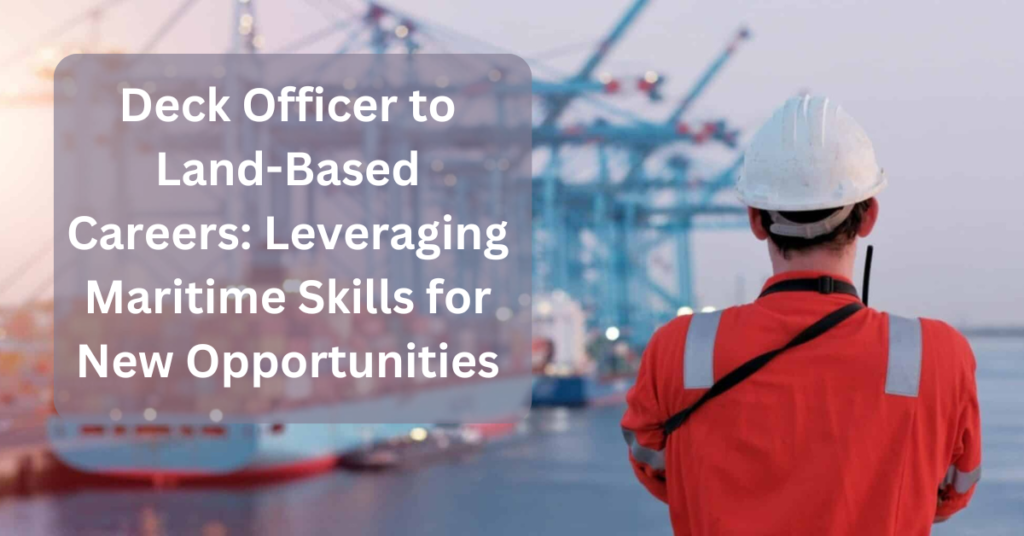Did you know that deck officers on ships, with their unique blend of leadership, navigation skills, and crisis management expertise, are not just confined to the maritime world? Imagine a career that starts with charting courses on the high seas and evolves into leading teams or managing projects on land. Intrigued? You should be!”
Welcome to our channel! Today, we’re diving deep into the world of deck officers and exploring how their skills can open doors to exciting career opportunities beyond the maritime sector. Stick around to discover how your sea-faring experience can lead to a land-based career filled with potential.”
Understanding the Role of Deck Officers

First, let’s understand what a deck officer does. Deck officers are crucial in managing the operations of a ship. Their daily tasks include navigation, overseeing the safety of the vessel, managing the crew, and ensuring the ship’s compliance with international regulations.”
To excel in this role, deck officers need a combination of specialized skills and qualifications. Key skills include advanced problem-solving, excellent communication, and strong leadership. They must also hold certifications such as STCW (Standards of Training, Certification, and Watchkeeping) and be adept in maritime laws and safety procedures.”
In the traditional maritime career path, deck officers typically start as third mates and can rise through ranks to become captains. This progression involves gaining experience, additional certifications, and accumulating sea time.”
But what if the open sea isn’t calling your name anymore? Stay tuned as we explore how the skills you’ve honed as a deck officer can be leveraged in various land-based careers. From project management to risk assessment, the possibilities are broader than you might think!”
Expanding Horizons: Career Opportunities Beyond Maritime
You’ve navigated the high seas and led teams through challenging situations, but what if you’re ready for a new adventure on land? Today, we’re exploring how your maritime skills can transition into exciting new fields beyond the traditional maritime sector.
We’re diving into a range of career opportunities where deck officers’ skills are not only transferable but highly valued. Let’s get started!
Project Management
First up is project management. Deck officers are experts in managing complex operations, making quick decisions, and leading diverse teams. These skills are directly applicable to project management roles.
“Skills you’ll use include strategic planning, risk management, and team coordination. Industries like construction, engineering, and logistics are always on the lookout for individuals who can oversee large-scale projects and ensure everything runs smoothly.”
Logistics and Supply Chain Management
Next, let’s talk logistics and supply chain management. As a deck officer, you’ve been involved in complex logistical planning and coordination at sea, skills that are incredibly valuable in land-based roles.
Your expertise in planning, coordination, and problem-solving will serve you well in warehousing, distribution, and transportation industries. Managing supply chains and ensuring timely deliveries are just a few of the tasks where your maritime experience can shine.
Safety and Risk Management
Moving on to safety and risk management—an area where your background in maritime safety protocols and emergency response is crucial. Deck officers are trained to handle emergencies and assess risks, skills that are highly sought after in corporate safety departments and insurance companies.
In these roles, you’ll leverage your risk assessment capabilities and your experience in managing safety protocols to help organizations mitigate risks and enhance their safety measures.
Environmental Consultancy
If you’re passionate about the environment, environmental consultancy might be a perfect fit. Your knowledge of maritime environmental regulations and sustainability practices can be applied to help organizations meet environmental standards and promote sustainable practices.
Potential industries include environmental agencies, non-profits, and consulting firms focused on sustainability.
Marine Technology and Innovation
For those interested in technology, marine tech and innovation offer exciting opportunities. Your technical skills and problem-solving abilities can be put to use in developing new maritime technologies or improving existing systems.”
Look for opportunities in tech startups, research institutions, and companies specializing in maritime technology.
Education and Training
Finally, if you enjoy teaching, consider a role in education and training. Your extensive industry knowledge and experience make you well-suited to train the next generation of maritime professionals.
Instructors at maritime academies and vocational training centers can benefit greatly from your practical insights and instructional skills.
There you have it—six exciting career paths where your maritime experience can lead to new opportunities. Whether you’re interested in project management, logistics, safety, environmental consultancy, marine technology, or education, your skills are in demand.
Transitioning to a New Career Path
Ready to steer your career into new waters? Transitioning from a deck officer to a different field might seem daunting, but with the right strategies, it can be a smooth journey. Let’s break down how you can make a successful career shift.
In this segment, we’ll explore how to identify and articulate your transferable skills, determine if additional qualifications are needed, leverage your network, and hear from those who’ve made the leap successfully.
Skill Translation
First up, skill translation. Deck officers have a rich skill set that’s highly transferable. Start by listing the skills you’ve developed—leadership, crisis management, logistics, and strategic planning, to name a few.
To articulate these skills, frame them in a way that highlights their relevance to your target industry. For instance, your experience in managing a ship’s operations can translate to project management or logistics roles. Use specific examples and quantify your achievements when possible.
Additional Qualifications
Next, consider additional qualifications. While many of your skills are directly applicable, some industries might require further education or certifications. For example, project management might benefit from a PMP (Project Management Professional) certification, while environmental consultancy could require knowledge in environmental science.
Look into relevant courses, workshops, or online programs that can bridge any knowledge gaps and make your transition smoother.
4. Resources and Support
Ready to take the next step in your career transition? Let’s explore some valuable resources and support systems that can help you navigate this exciting change.
In this segment, we’ll cover professional organizations, online courses and certifications, and career counseling services that can provide the guidance and support you need.
Professional organizations are excellent resources for career transition support. Here are a few to consider:
1. Project Management Institute (PMI) – Offers resources and certifications for project management. [PMI.org](https://www.pmi.org)
2. American Society of Safety Professionals (ASSP)– Provides networking and certification opportunities in safety and risk management. [ASSP.org](https://www.assp.org)
3. Institute of Logistics and Transport (ILT) – Focuses on logistics and supply chain management. [ILT.org](https://www.ilt.org)
4. International Maritime Organization (IMO) – While maritime-focused, IMO offers insights into environmental regulations that can be useful in consultancy. [IMO.org] (http://www.imo.org)
Joining these organizations can help you connect with industry professionals, access valuable resources, and stay updated on industry trends.
Online Courses and certification
Online courses and certifications can help bridge the gap between your maritime experience and your new career goals. Here are some platforms and certifications to consider:
Coursera: Offers courses in project management, logistics, and environmental science. [Coursera.org](https://www.coursera.org)
Udemy: – Provides various courses on project management, supply chain management, and risk management. [Udemy.com](https://www.udemy.com)
edX: – Features professional certifications and courses in environmental science and technology. [edX.org](https://www.edx.org)
LinkedIn Learning: – Offers a range of courses relevant to management, safety, and environmental consultancy. [LinkedInLearning.com](https://www.linkedin.com/learning)
These platforms offer flexible learning options to help you gain the qualifications needed for your new career path.
Career counseling services can provide personalized support during your transition. Consider these options:
- CareerOneStop: – Offers resources for career exploration and transition. [CareerOneStop.orghttps://careeronestop.org/](https://www.careeronestop.org)
- The Muse: – Provides career coaching and job search assistance. [TheMuse.com](https://www.themuse.com)
- Local Career Centers: – Many communities offer free or low-cost career counseling services. Check local resources for options.
Career counselors can help you assess your skills, explore new career paths, and prepare for job interviews.
Conclusion
To wrap up, we’ve covered essential resources and support systems to help you on your career transition journey. Remember, professional organizations, online courses, and career counseling can provide the tools and guidance you need to succeed.
Changing careers can be a challenging but incredibly rewarding experience. Embrace the journey with confidence, knowing that your skills and experiences are valuable assets in any industry.
We’d love to hear from you! Share your career transition stories or ask any questions in the comments below. If you found this video helpful, please like, subscribe, and share it with others who might benefit. Thanks for watching, and best of luck on your career journey!



